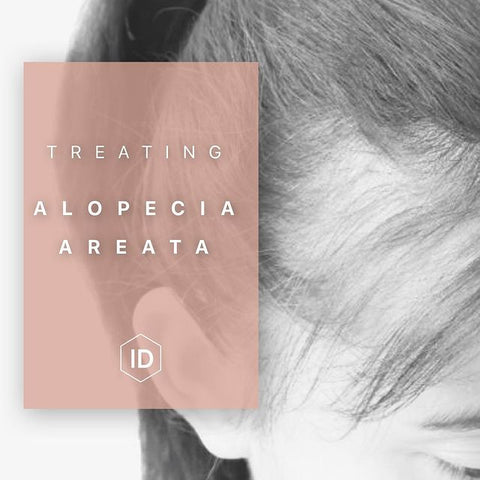Treating Alopecia Areata

The term alopecia means hair loss and in Alopecia Areata one or more round patches of hair loss may appear suddenly, most commonly on the scalp. It can affect males and females at any age, and it starts during childhood in approx. 50% of people. Lifetime risk is approximately 1-2%. It is an auto-immune disorder and is more commonly seen in individuals with a family history of Alopecia areata and other autoimmune diseases such as Vitiligo and thyroid disease. It is also more commonly seen in those with atopic dermatitis (eczema).
Triggers for its development include trauma, hormonal change, emotional and/or physical stressors. Patches of alopecia areata may affect any hair-bearing area, most often the scalp, eyebrows, eyelashes and beard. It occurs in 3 stages – sudden loss of hair, enlargement of the patch and then regrowth of fine downy hair within the patch.
Treatment of Alopecia Areata is dependent on the age of the affected individual, the location of the hair loss and percentage of total hair loss. Unfortunately, there is not one single treatment which can guarantee regrowth of all of the hair, however there are a range of topical and systemic therapies available.
First line topical therapies include: Topical potent/ultra-potent steroids, depending on the location of hair loss, and Minoxidil foam.
Intralesional steroid injections with Triamcinolone acetonide 2.5-5mg/ml injected into each patch. This therapy likely requires repeated treatments every 6-8 weeks.
Topical immunotherapy with Diphenylcycloprophenone may be considered in suitable individuals, however, is not recommended for young children as it results in development of dermatitis of the treated area which may be intolerable for the younger patient
Oral steroids can be used, or given in pulsed doses, however long-term use of oral steroids is not recommended due to their potential side effects.
Oral systemic therapies such as Ciclosporin and Methotrexate may also be considered for severe Alopecia Areata however you would be required to have likely failed the above therapies and have discussed the potential benefits and risks with your doctor.
Newer therapies include the JAK inhibitors (Janus Kinase inhibitors) such as Tofacitinib which is an oral therapy, which may also be considered for those with severe Alopecia Areata.
.
Other treatment options include counselling for patients who are severely affected as hair loss has a significant impact on your quality of life.Camouflaging the hair loss with hair fibres/ hair-pieces may also be considered and eyebrow pigment placement, such as ID Brows.
.
Please get in touch with us on (01) 912 3030 or mail us at info@instituteofdermatologists.ie if you would like to explore the best treatment options for you.